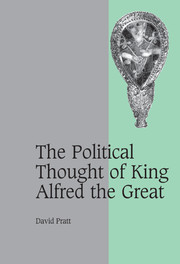Book contents
- Frontmatter
- Contents
- Acknowledgements
- List of abbreviations
- Note on citations
- Chapter 1 INTRODUCTION
- Part I The West Saxon Political Order
- Part II Alfredian Discourse and its Efficacy
- Chapter 7 THE FIELD OF ALFREDIAN KNOWLEDGE
- Chapter 8 THE CONSTRUCTION OF ALFREDIAN DISCOURSE
- Chapter 9 ALFREDIAN TECHNOLOGY: BOOKS AND ÆDIFICIA
- Chapter 10 THE HIERDEBOC AS A TREATISE OF POWER
- Chapter 11 THE DOMBOC AS A REORIENTATION OF ROYAL LAW
- Chapter 12 TRIBULATION AND TRIUMPH IN THE FIRST FIFTY PSALMS
- Chapter 13 THE SEARCH FOR A SATISFACTORY CONSOLATION
- Chapter 14 SEEING GOD AS HE IS
- Chapter 15 CONCLUSION
- Appendix: West Frankish deployment of Solomon's dream
- Bibliography
- Index of manuscripts
- General index
- Cambridge Studies in Medieval Life and Thought Fourth Series
Chapter 8 - THE CONSTRUCTION OF ALFREDIAN DISCOURSE
Published online by Cambridge University Press: 06 July 2009
- Frontmatter
- Contents
- Acknowledgements
- List of abbreviations
- Note on citations
- Chapter 1 INTRODUCTION
- Part I The West Saxon Political Order
- Part II Alfredian Discourse and its Efficacy
- Chapter 7 THE FIELD OF ALFREDIAN KNOWLEDGE
- Chapter 8 THE CONSTRUCTION OF ALFREDIAN DISCOURSE
- Chapter 9 ALFREDIAN TECHNOLOGY: BOOKS AND ÆDIFICIA
- Chapter 10 THE HIERDEBOC AS A TREATISE OF POWER
- Chapter 11 THE DOMBOC AS A REORIENTATION OF ROYAL LAW
- Chapter 12 TRIBULATION AND TRIUMPH IN THE FIRST FIFTY PSALMS
- Chapter 13 THE SEARCH FOR A SATISFACTORY CONSOLATION
- Chapter 14 SEEING GOD AS HE IS
- Chapter 15 CONCLUSION
- Appendix: West Frankish deployment of Solomon's dream
- Bibliography
- Index of manuscripts
- General index
- Cambridge Studies in Medieval Life and Thought Fourth Series
Summary
‘ROYAL’ PRODUCTION: ALFREDIAN DISCOURSE AND ITS DISTINCTIVENESS
The role of production embraces many of the most problematic features of Alfredian kingship. This chapter addresses the role of the texts attributed to Alfred, and their position in the programme as a whole. As such, it serves a twofold purpose: a unique context for the king's texts would also extend the basis for their systematic study. From the degree of investment in these texts, it is difficult not to regard Alfred's personal role in their composition as entirely central to their potential value. Yet much depended on an appropriate medium: one must focus initially on Alfred's textual image, and the means by which it was sustained.
The value of Alfred's texts was enhanced most directly by the assertion of his role in composition. Royal authorship attracted much effort in its repeated establishment. The help of scholarly helpers was acknowledged for the Hierdeboc; even here Alfred's role was firmly asserted in the Verse Preface. There were no such qualifications for the Boethius: the authenticity of the Prose Preface has sometimes been questioned, but Sisam argued convincingly for its basis in Alfredian material. The first-person of the king intervenes most strongly in the law-book towards the end of the preface. The Soliloquies are more problematic: the only reference to Alfred occurs at the end, and need not be contemporary. Yet the opening of the preface has been lost: his first-person is well established in the portion that survives.
- Type
- Chapter
- Information
- The Political Thought of King Alfred the Great , pp. 130 - 178Publisher: Cambridge University PressPrint publication year: 2007

